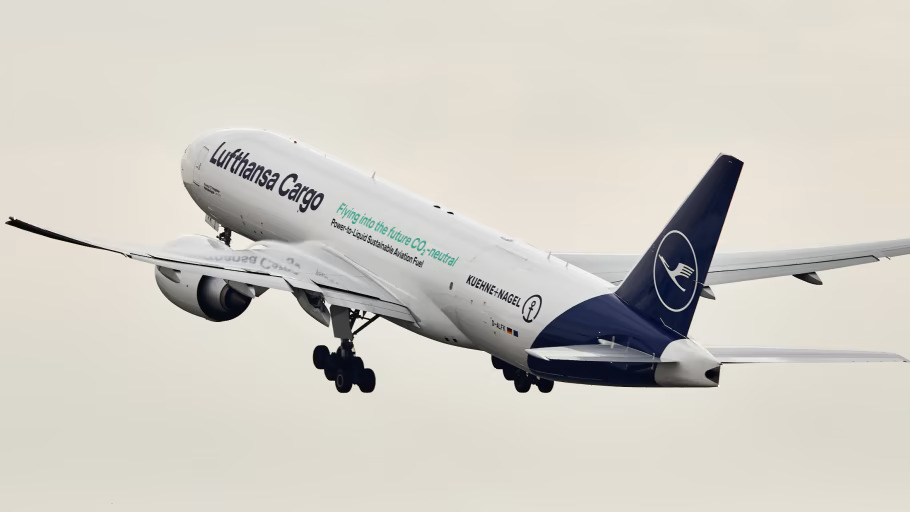Lufthansa Cargo and Kuehne+Nagel advocate power-to-liquid technology

Branded Boeing 777 freighter D-ALFK en route worldwide as ambassador for joint mission
This morning at 09:07 CET, the Lufthansa Cargo freighter with the registration D-ALFK took off for the first time under flight number LH8406 to Seoul, South Korea (ICN) with a new flight-ready livery: with the inscription “Flying into the Future CO2-neutral” and the addition “Power-to-Liquid Sustainable Aviation Fuel”, logistics service provider Kuehne+Nagel and Europe’s leading cargo airline Lufthansa Cargo are now drawing attention to their joint mission. The two companies are working together to promote the forward-looking power-to-liquid technology in order to advance the decarbonization of air freight. Kuehne+Nagel and Lufthansa Cargo had agreed on an exclusive partnership to this last year.
“We are very pleased to now also visibly express our joint commitment and to publicize it with the help of the global deployment of our freighter. A successful and sustainable transformation of airfreight can only succeed if we join forces with strong partners – which is why we are very proud to have Kuehne+Nagel at our side as a supporter of this forward-looking technology,” explains Dorothea von Boxberg, CEO at Lufthansa Cargo.
Yngve Ruud, Member of the Management Board of Kuehne+Nagel, responsible for Air Logistics, says: “With the new Boeing 777 freighter D-ALFK in Kuehne+Nagel’s livery, we are sending a strong signal our company’s commitment to sustainable airfreight. We are already seeing a great deal of interest from our customers who want to avoid the carbon emissions of their shipments worldwide and the synthetic SAF project with Lufthansa Cargo is of utmost importance for our joint mission of CO2-neutral aviation.”
The logistics service providers have jointly committed to supporting the world’s first production site for synthetic crude oil in Werlte/Emsland in Germany by purchasing the equivalent of 20 metric tons, or 25,000 liters, annually. The synthetic fuel based on this is considered the fuel of the future, which is expected to further reduce the CO2 footprint of aircraft engines in the future. The production site in Werlte is operated by the Bonn-based NGO atmosfair. The first quantities of crude oil are to be produced this year and used as synthetic fuel in aviation.
CO2-neutral fuels or Sustainable Aviation Fuels (SAF) are an essential pillar on the way to CO2-neutral flying. These fuels can be produced in various ways. To date, Lufthansa Cargo and Kühne+Nagel have used Sustainable Aviation Fuels of biogenic origin, i.e. synthetic kerosene based on used cooking oils, for example. In the case of synthetic kerosene, which is also known as power-to-liquid fuel, on the other hand, the synthetic crude oil is produced from regeneratively generated electricity, water and CO2. Because of this process, PTL-based aviation fuel is considered CO2-neutral. The power-based fuels are currently still in the development stage towards industrial production, but are already considered a long-term alternative to conventional kerosene or biogenic SAF, as they are theoretically to be produced without availability limits.
